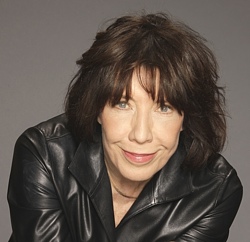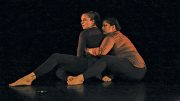By: Chris Azzopardi*/Special for TRT–
Lily Tomlin launched her career over four decades ago with a timeless clan of wacky characters that she established on NBC’s sketch comedy show Rowan and Martin’s Laugh-In. But what if she had to be friends with Edith Ann, Ernestine or Susie the Sorority Girl?
It’s something the veteran comedian – and actress, who’s starred in The West Wing and Desperate Housewives – never considered until now, making Tomlin rethink her entire career. Tomlin also dished on how, despite rumors, she has no plans to retire; missing the “the sneaking around” before gay liberation; and what we can expect from her progressive, pot-smoking part alongside Reba McEntire in her first major sitcom role since Murphy Brown.
Q. Of all your iconic characters, do you have a favorite?
A. They’re like kids. You don’t show partiality. It just seems wrong.
Q. Would you want to be friends with any of them?
A. Let me think. You’re right. Golly – they’re bad news. (Laughs) I don’t know if I want to be friends with any of them! This is a startling awakening. No one’s ever asked me that question. I was running through them really quickly and I thought, “Well, that one would be a handful, and this is a high-maintenance relationship.”
Q. Right! Could you imagine being friends with Edith Ann?
A. Imagine having to be her mother! I had an Edith Ann puppet with eyes and a tongue – and everything was animatronics – and we never did anything with her, but I was so wanting a kids show starring Edith Ann. Anyway, so she sits in a big old box right now. Poor thing. She’s probably all deteriorated. But they sculpted the puppet head after me – the way I perform her – and it had a vague resemblance to me. It was always sort of spooky. (Laughs)
Q. So, let me get this straight: Your characters are needy and they scare the hell out of you. You might want to rethink your career, Lily.
A. (Laughs) Oh gosh. This has been revelatory. This one question is something I had never heard in my life and never even contemplated.
Q. You and your partner, Jane Wagner, have been together for more than 40 years, right?
A. Yeah. It’s been – what is this? 2012? I have to think back. It’s 41 years, but it’ll be 42 years in March.
Q. Back then, when you realized you were gay, people didn’t even acknowledge it. Gay was taboo. Do you think that’s part of the reason you and Jane have been together so long but haven’t married? Because you never expected to?
A. No, I don’t think so. I guess it doesn’t mean that much. With the concept of marriage, I’ve been a little too flippant and I’ve said things like, “I was hoping the gay community would come up with a better idea than imitating heterosexual marriage.” (Laughs)
But no, I know plenty of people who married and who are pleased about it and are happy. I guess if we had any kids, it would mean something more. Neither of us is religious, so that means nothing to us. I’m proud and happy for it, for people who want to be married. I suppose symbolically it would’ve been nice if we had gotten married for anybody who’s interested.
Q. You talk about Jane as your partner to the press often now. Was that always the case?
A. I used to talk about her all the time. I just talked about it naturally, but in those days people just did not write that way. When I was on the cover of Time in ’77, my publicist had almost pulled off the old two-cover coup where you get Newsweek and Time. It’s not even important anymore. For both stories, Jane would be there. It was nothing.
One story, I can’t remember which one, said, “Lily lives alone in the Hollywood Hills”; another one said that we shared a house – me and writer Jane Wagner. They knew we were a couple. They used to protect us. The journalists would protect us just like they would protect politicians in the old days.
Q. You probably never imagined you’d be talking to gay publications like you do so often now. Is that different for you?
A. Yeah, of course it is. We had The Advocate. Vito Russo, who was my good friend, did a piece on me in The Advocate. What year was that? Probably sometime in the ’70s. And he didn’t want to out me in a really big way that would bring any kind of repercussions on me at that time, because I was very, very popular from Laugh-In. I said to him, “Look, I want to do the piece with The Advocate but I don’t want to lie. It’s too embarrassing and too awkward to do that.” I said, “I’m leaving it up to you. I’m not going to try to influence whatever you do.” So in the piece, I do say to him, “Look, if we don’t talk about the gay issue it’s going to look very strange.” And he kept writing in that vein. But it was never explicit; of course, I’d get a lot of flack for it, a lot of heat. People weren’t that – I want to say hip.
Q. Isn’t it amazing how much progress we’ve made since then?
A. It’s been remarkable. I mean, it’s not enough if it’s still an issue, but yeah – I’ve been just really dazzled by the activism and the refusal to disappear and be invisible. But I’ll tell you: You miss a little bit of repression, just on the sexy side. The sneaking around. Any kind of taboo is always a little more titillating.
Q. Your upcoming series, Malibu Country, features a flamboyant record executive played by Jai Rodriguez from Queer Eye for the Straight Guy and a next-door neighbor who’s gay. Were you surprised that a show starring Reba McEntire, whose fan base tends to be ultra conservative, was so gay and progressive?
A. Yeah, and I’m not sure where they’re going to take the kid next door, but I hope Lillie Mae gets very political. I’ve sort of pitched that to them, to go in that direction with my character. She’s just more enlightened than Reba, even though she’s Reba’s mother. She’s just more open and expansive, where Reba is a little more Nashville and shut down. She’ll definitely be more progressive.
Q. So your character’s name isn’t Shirley anymore?
A. I changed it. It’s Lillie Mae. I changed it to my mother’s name.
Q. What about the character interested you? The gray wig?
A. (Laughs) I built that wig! I had that wig made. Wigs always interest me. Haven’t you ever heard of Wigstock? I’m kidding. I have a wig room; I have at least 50 to 70 wigs. I’m kind of a wig queen.
You know, first of all, Reba. I’m not close friends with Reba or anything, but my brother lives in Nashville, and my mother and dad are both buried in Nashville, and so having those Southern roots, I know the culture very well. I’ve always liked Reba, but then I saw her in Annie Get Your Gun in ’99 and she was drop-dead brilliant. People still talk about it. She was so alive in that role. I’ve never forgotten that. And because in the pilot Lillie Mae smokes dope, I thought this is a great chance to do an older person who’s just really open to everything.
Q. Word is that you’re retiring after this series, which you mentioned during the recent Television Critics Association panel. Is that true?
I said it as a joke. Somebody in the audience asked me a question, something about playing a woman of a certain age; it was hard to hear. Maybe they were talking about how lately I’ve played all these mothers: I’m playing Lisa Kudrow’s mother on Web Therapy and I just did a movie playing Tina Fey’s mother. I also played McGee’s grandmother on NCIS. (The person asked) something about playing women of a certain age, so I answered it as Edith Ann first and then I said, “Don’t be surprised if this is the last project I do before I go to the motion-picture home.” I was just kidding around.
Q. So you’re not retiring anytime soon?
A. I don’t plan to.
Q. You come from a generation of female comedians that had a very family-oriented style of comedy. What’s your take on this new wave of female comedians both in film and in stand-up who are just as vulgar and crass as men?
A. Guys have done it forever and so the girls just leveled the playing field. I like a much more cerebral kind of comedy. Well, sort of cerebral. But I still have no problem with it. I’m glad to see those girls make successful comedy. Because in the old days – I mean, Gilda (Radner) never got the chance to do the films that the boys did from SNL. I’m glad that these girls break that taboo, that obstacle that people have put up in front of them for years.
I remember I used to do a ’50s teenager at a school dance and the first time I did it at the Ice House in Pasadena – this would be like ’71 or ’72, right after I got on Laugh-In – and (I said) “boner.” And the owner of the Ice House was beside himself. He says, “Don’t ever use that language on the stage again.” The guys did anything they wanted, but they did not want to see women talking about anything that was the least bit – I don’t know – human. (Laughs) I didn’t listen to what he said.
*Chris Azzopardi is the editor of Q Syndicate, the international LGBT wire service. Reach him via his website at www.chris-azzopardi.com.








